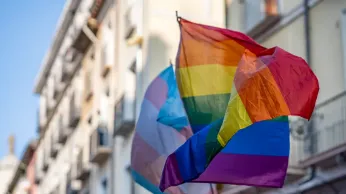
Jul 24
Canada Halts Deportation of Non-Binary US Citizen, Citing Escalating Risks for LGBTQ+ People in America
READ TIME: 3 MIN.
Canada has temporarily halted the deportation of Angel Jenkel, a non-binary US citizen, citing mounting risks to LGBTQ+ people in the United States under the Trump administration’s recent legislative and executive actions . The decision, delivered by Justice Julie Blackhawk, came after an urgent judicial review found that the original risk assessment by immigration officers was “flawed and unreasonable” due to reliance on outdated information and failure to account for the current environment facing sexual and gender minorities .
Jenkel, who uses they/them pronouns, arrived in Canada from Minnesota in August 2022 to visit their Canadian boyfriend, who later became their fiancé. The couple’s plans changed dramatically when Jenkel’s partner developed severe epilepsy, requiring ongoing care. Jenkel overstayed their six-month visitor visa to provide support as no one else could assist with their fiancé’s deteriorating health .
When Canadian authorities initiated removal proceedings, Jenkel applied for a pre-removal risk assessment, a process that allows individuals facing deportation to argue that returning to their country of origin would put them at risk of serious harm. Despite presenting concerns about the worsening situation for LGBTQ+ people in the US, Jenkel’s claim was initially rejected .
Since President Donald Trump’s return to office in January 2025, his administration has enacted several policies widely seen as hostile to LGBTQ+ rights. These include a ban on transgender people serving in the military, the restriction of gender-affirming healthcare for individuals under 19, and official government policy asserting that there are “only two sexes” . Additionally, diversity, equity, and inclusion (DEI) programs have been eliminated across federal agencies and the armed forces .
Advocacy groups and legal experts warn that these measures have fostered an environment of heightened discrimination, legal uncertainty, and targeted violence against LGBTQ+ individuals . According to Devon Matthews, head of programs at Rainbow Railroad, a non-profit that assists 2SLGBTQ+ refugees, “We’ve seen firsthand the deteriorating conditions for LGBTQI+ people in the U.S., from the escalation of anti-trans legislation to targeted violence and growing legal uncertainty” .
Justice Blackhawk’s decision to pause Jenkel’s deportation represents a significant judicial acknowledgment of the evolving risks for LGBTQ+ people in the United States. The judge cited the need for updated, accurate risk assessments that take into account the ongoing policy changes and their effects on marginalized communities .
Jenkel, speaking to The Canadian Press, emphasized that returning to the US would mean facing a country that is “not the same as the one I left”—a sentiment echoed by many LGBTQ+ Americans who have sought asylum or refuge abroad since the administration’s policy shifts began .
Legal observers note that while stays of removal are not uncommon, it is rare for Canadian courts to cite conditions for LGBTQ+ people in the United States as grounds for halting deportation. This case may set a precedent for future claims involving sexual orientation and gender identity as factors in immigration and refugee proceedings .
The legal and social developments in the US have sparked international concern, with organizations such as the Williams Institute at UCLA warning that mass deportations and the rollback of rights disproportionately impact LGBTQ+ non-citizens . The American Immigration Council has also documented increasing uncertainty for LGBTQ+ families and individuals, particularly around citizenship and legal protections .
For advocates, the Jenkel case is both a warning and a call to action. “This is a wake-up call for countries like Canada to recognize the very real dangers facing LGBTQ+ people—even in countries generally considered safe,” said Matthews of Rainbow Railroad .
Jenkel’s stay of removal is temporary, lasting only until a full judicial review is concluded. Should the review find that Jenkel faces credible risk of harm, it could result in a new risk assessment and potentially allow them to remain in Canada. For now, Jenkel and their fiancé are waiting, in hope and uncertainty, as their case becomes a focal point in the ongoing debate over LGBTQ+ rights, asylum, and international responsibility.






